How to Ask "How Are You?" in Korean and How To Answer
From Formal to Casual: Here are the Top Ways to Ask “How Are You?” in Korean
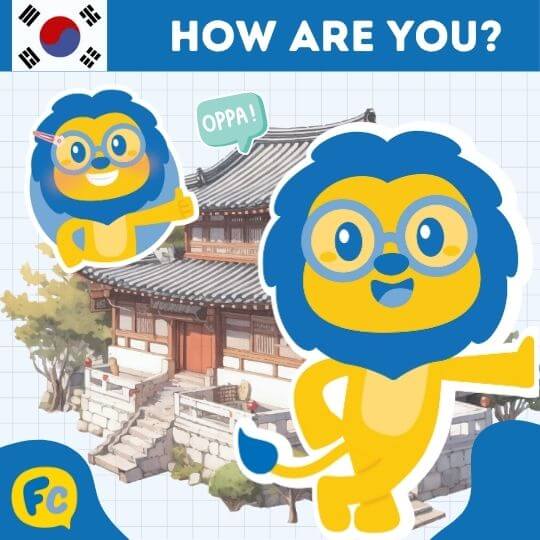
There are many different ways to ask “How are you?” in Korean.
As with other cultures, the expression ‘how are you’ can vary depending on the person you’re addressing and the situation.
Regardless, “How are you?” is one of the best ways to start a conversation, so let’s master this phrase to kickstart all those future Korean conversations you’re going to have!
Let’s find out some of the most common ways Koreans greet each other
⬇️ Interested in something specific? Clicking on the link will bring you to your preferred section!
How to Say How Are You In Korean | The Most Common Way to Say How Are You
How to Say How Are You In Korean | Other Ways to Say How Are You in Korean
How to Say How Are You In Korean | How To Respond to How Are You in Korean
How to Say How Are You In Korean | Quiz
How to Say How Are You In Korean | FAQ
Looking back in history, eating well and being healthy was a great priority.
This is why many greetgins in Korean are associated with health.
The Most Common Way to Say How Are You
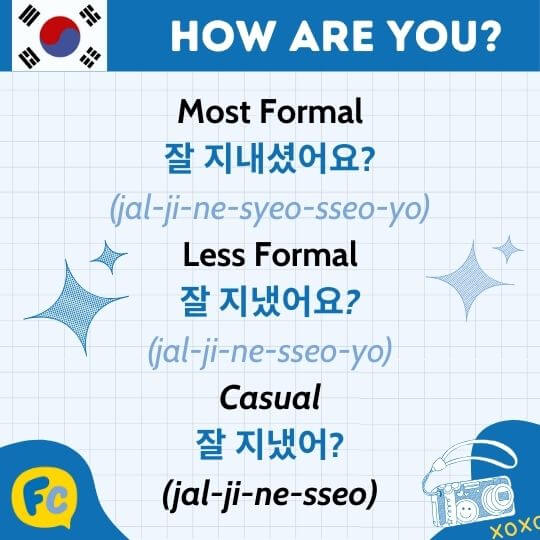
잘 지내셨어요? (jal-ji-ne-syeo-sseo-yo) – Most formal
👉 The most common expression of how are you is 잘 지내셨어요? (jal-ji-ne-syeo-sseo-yo).
These are the words you will hear most of the time. These words are actually past tense, asking how life has been lately.
The closest meaning will be – Have you been well?
Let’s break it down to see how the words were formed.
| Korean | transliteration | English |
|---|---|---|
| 잘 | jal | means well |
| 지내다 | ji-ne-da | to spend (in terms of time) |
| 지내셨어요 | ji-ne-syeo-sseo-yo | formal past tense of 지내다 (to spend) |
The most formal of its forms, we use this to people we need to show the most respect to.
Teachers are one of the most respected professions in Korea. 님 (nim) is an honorific used at the end of occupations such as teachers, doctors, and managers. It is also used at the end of a name to show respect.
👉 Learn more about Korean honorifics and Korean past tense
So here is how you would ask your teacher.
선생님 잘 지내셨어요? (seon-saeng-nim jal ji-ne-syeo-sseo-yo)
Have you been well teacher?
To greet someone specifically, this is how you would tell them.
background-color:rgba(0, 0, 0, 0) class="has-inline-color has-main-color"> 잘 지내셨어요? (Young-Mee-nim jal ji-ne-syeo-sseo-yo)
Have you been well Young Mee?
잘 지냈어요? (jal-ji-ne-sseo-yo) – Less formal
👉 Another polite way to say how are you is 잘 지냈어요? (jal-ji-ne-sseo-yo). The meaning is exactly the same but uses a less formal past tense at the end. This would be used in any general situation.
영미씨 잘 지냈어요? (Young-Mee-ssi jal ji-ne-sseo-yo)
Have you been well, Young Mee?
We add the honorifics 씨 (ssi) instead of 님 (nim) after someone’s name for less formal situations.
잘 지냈어? (jal-ji-ne-sseo) – Casual
A great way to ask a close friend how are you is 잘 지냈어? (jal-ji-ne-sseo) You can always add hello at the front.
영미야 background-color:rgba(0, 0, 0, 0) class="has-inline-color has-main-color"> 잘 지냈어? (Young-mee-ya an-young jal ji-ne-sseo)
Hi Young Mee, have you been well?
Other Ways to Say How Are You in Korean
| Korean | transliteration | formality |
|---|---|---|
| 어떻게 지내셨어요? | (eo-tteo-ke ji-ne-syeo-sseo-yo) | Most formal |
| 어떻게 지냈어요? | (eo-tteo-ke ji-ne-sseo-yo) | Less formal |
| 어떻게 지냈어? | (eo-tteo-ke ji-ne-sseo) | Casual |
| 어떻게 | (eo-tteo-ke) | Means HOW |
지내 셨어요 (syeo-sseo-yo) is the formal past tense for 지내다 (ji-ne-da)
This would translate to – How have you been?
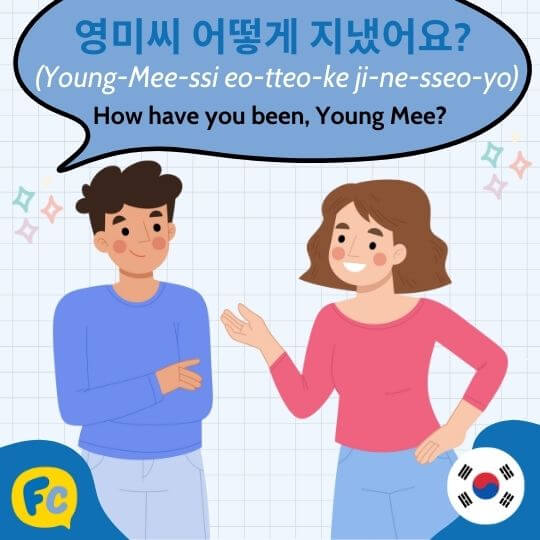
| Korean Phrase | transliteration | English |
|---|---|---|
| 선생님 어떻게 지내셨어요? | (eo-tteo-ke ji-ne-syeo-sseo-yo) | How have you been, teacher? |
| 영미씨 어떻게 지냈어요? | (Young-Mee-ssi eo-tteo-ke ji-ne-sseo-yo) | How have you been, Young Mee? |
| 영미야 어떻게 지냈어? | (Young-mee-ya eo-tteo-ke ji-ne-sseo) | How have you been, Young Mee? |
뭐하다 (mo-ha-da) is a colloquial form of 무엇을 하다 (mu-eo-sseul-ha-da) meaning to do something.
| Korean | Pronunciation | Formality |
|---|---|---|
| 뭐하고 지내셨어요? | (mo-ha-go ji-ne-syeo-sseo-yo) | Most formal |
| 뭐하고 지냈어요? | (mo-ha-go ji-ne-sseo-yo) | Less formal |
| 뭐하고 지냈어? | (mo-ha-go ji-ne-sseo) | Casual |
Basically, 무엇 (mu-eot) becomes 뭐 (mo) in short form.
So 뭐하고 지내셨어요? (mo-ha-go ji-ne-syeo-sseo-yo) will translate to what have you been up to?
| Korean | Pronunciation | English |
|---|---|---|
| 선생님 뭐하고 지내셨어요? | (seon-saeng-nim mo-ha-go ji-ne-syeo-sseo-yo) | What have you been up to, teacher? |
| 영미씨 뭐하고 지냈어요? | (Young-Mee-ssi mo-ha-go ji-ne-sseo-yo) | What have you been up to, Young Mee? |
| 영미야 뭐하고 지냈어? | (Young-Mee-ya mo-ha-go ji-ne-sseo) | What have you been up to, Young Mee? |
Koreans love asking ‘have you eaten’ as a form of greeting.
For example:
As well-being has been a subject of interest throughout history and food was once scarce, asking if they’ve eaten is another favourite greeting Koreans use.
| Korean | transliteration | Formality |
|---|---|---|
| 밥은 드셨어요? | (bap-eun du-syeo-sseo-yo) | Most formal |
| 밥은 먹었어요? | (bap-eun mo-go-sseo-yo) | Less formal |
| 밥 먹었어? Or 밥은? | (bap-mo-g-sseo) or (bap-eun) | Casual |
For example:

| Korean | transliteration | English |
|---|---|---|
| 선생님 밥은 드셨어요? | (seon-saeng-nim bap-eun du-syeo-sseo-yo) | Have you eaten, teacher? |
| 영미씨 밥은 먹었어요? | (Young-Mee-ssi bap-eun mo-go-sseo-yo) | Have you eaten, Young Mee? |
| 영미야 밥은 먹었어? | (Young-Mee-ya bap-eun mo-go-sseo) | Have you eaten, Young Mee? |
When you meet someone in a long time, you can use this expression to say ‘It’s been a long time.’
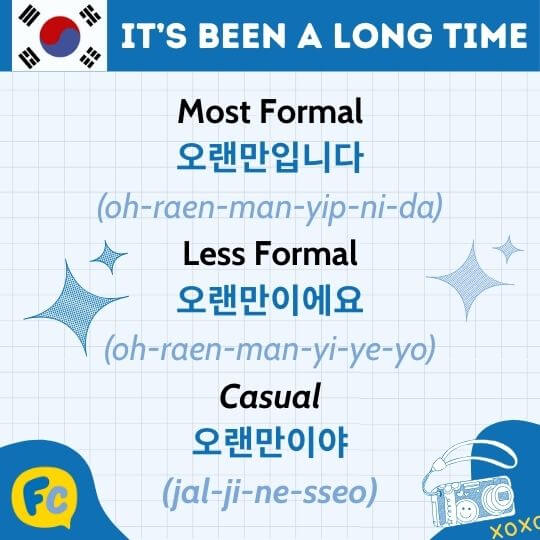
| Korean | transliteration | Formality |
|---|---|---|
| 오랜만입니다 | (oh-raen-man-yip-ni-da) | Most formal |
| 오랜만이에요 | (oh-raen-man-yi-ye-yo) | Less formal |
| 오랜만이야 | (oh-raen-man-yi-ya) | Casual |
For example:
| Korean | transliteration | English |
|---|---|---|
| 선생님 오랜만입니다 | (seon-saeng-nim oh-raen-man-yip-ni-da) | It’s been a while, teacher. |
| 영미씨 오랜만이에요 | (Young-Mee-ssi oh-raen-man-yi-e-yo) | It’s been a while, Young Mee. |
| 영미야 오랜만이야 | (Young-Mee-ya oh-raen-man-yi-ya) | It’s been a while, Young Mee. |
How To Respond To How Are You in Korean
👉 Here are some ways you can respond when someone greets you with ‘how are you’ in Korean. An important reminder is that Koreans don’t use honorifics to themselves, as this is to be humble and lower oneself when speaking to someone.
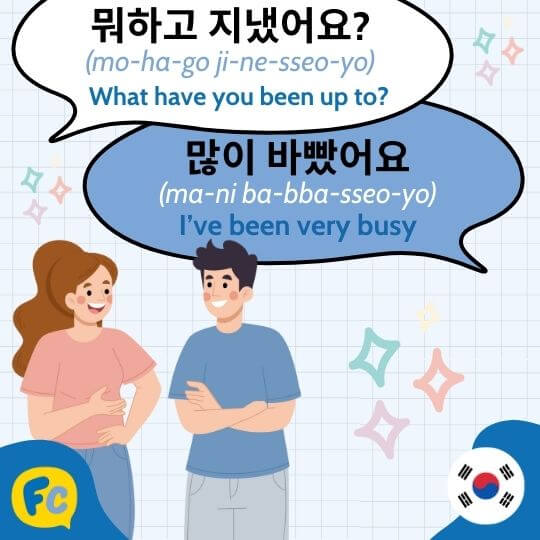
If someone asks you on of the following forms of ‘How Are You’:
| Korean (most FORMAL) | transliteration | English |
|---|---|---|
| 잘 지냈어요? | jal-ji-ne-sseo-yo | Have you been well? |
| 어떻게 지냈어요? | eo-tteo-ke ji-ne-sseo-yo | How have you been? |
| 뭐하고 지냈어요? | mo-ha-go ji-ne-sseo-yo | What have you been up to? |
You can reply in one of the many examples provided below:
| Korean | transliteration | English |
|---|---|---|
| 잘 지냈어요 | jal ji-ne-sseo-yo | I’ve been well |
| 조금 아팠어요 | jo-geum ah-pa-sseo-yo | I’ve been sick a bit (If you want to explain that you haven’t been well due to being sick) |
| 많이 아팠어요 | ma-ni ah-pa-sseo-yo | I’ve been really sick lately |
| 나쁘지 않았어요 | na-ppu-ji ah-na-sseo-yo | Not bad (When you are feeling not too bad but not too great either) |
| 조금 바빴어요 | jo-geum ba-bba-sseo-yo | I’ve been busy (If a lot has been happening lately) |
| 많이 바빴어요 | ma-ni ba-bba-sseo-yo | I’ve been very busy |
Just with this lesson alone, you have learned more than four ways to say ‘how are you’ in Korean. Get creative and try to use different expressions you’ve learned to different people. Speaking is the only way to make this expression yours so make sure to get out there and interact.
Check out our other blogs that teach you useful Korean grammar and culture here:

38 Korean Phrases All Beginners Need To Know
Looking for some basic Korean phrases to learn? Check out this article for the most important Korean phrases that will give you a head start.
USEFUL VOCABULARY
👇 We should have you pretty well covered with the following vocabulary and phrases:
| Korean | Transliteration | English |
|---|---|---|
| 잘 | jal | well |
| 지내다 | ji-ne-da | to spend (in terms of time) |
| 지내셨어요 | ji-ne-syeo-sseo-yo | have you been (formal) |
| 어떻게 | eo-tteo-ke | how |
| 뭐하다 | mo-ha-da | to do something |
| 밥 | bap | rice/meal |
| 드셨어요 | du-syeo-sseo-yo | have you eaten (formal) |
| 먹었어요 | mo-go-sseo-yo | have you eaten (less formal) |
| 오랜만 | oh-raen-man | it’s been a while |
| 선생님 | seon-saeng-nim | teacher (with honorific) |
| 건강 | geon-gang | health |
| 아프다 | ah-peu-da | to be sick |
| 바쁘다 | ba-ppeu-da | to be busy |
| 잘 지냈어요 | jal-ji-ne-sseo-yo | I’ve been well (less formal) |
| 조금 | jo-geum | a little |
| 많이 | ma-ni | a lot |
| 나쁘지 않았어요 | na-ppu-ji ah-na-sseo-yo | not bad |
BONUS || Did you enjoy reading this article? Why not expand your conversational skills even further and learn how to ask How Are You in Japanese, How Are You in Chinese and How Are You in Italian!
How to Say How Are You In Korean | Quiz
Have you correctly learned the Korean vocabulary on this page?
Have a try right now and get immediate results:
How to Say How Are You In Korean | FAQ
What is the most common way to ask “how are you?” in Korean?
The most common way to ask “how are you?” in Korean is “잘 지내세요?” (jal jinaeseyo?), which literally means “Are you doing well?” It’s a polite and natural way to check in on someone.
Are there informal ways to ask “how are you?” in Korean?
Yes! If you’re speaking with a close friend or someone younger, you can say “잘 지내?” (jal jinae?). It’s the casual version of the same phrase and fits informal situations.
How do you ask someone about their health in Korean?
건강은 어떻세요? (geon-gang eun ot-tto-sae-yo)
How is your health lately?
What is a formal way to ask “how are you?” in a business or respectful setting?
In more formal settings, you can use “어떻게 지내십니까?” (eotteoke jinaesimnikka?). This is very polite and often used in professional environments or when speaking to elders.
How should I respond when someone asks me “How are you?” in Korean?
You can respond with “네, 잘 지내요.” (ne, jal jinaeyo), which means “Yes, I’m doing well.” If you’re not feeling well, you can say “아니요, 잘 못 지내요.” (aniyo, jal mot jinaeyo), meaning “No, I’m not doing well.”
Want More From LTL?
FANCY LEARNING KOREAN? Check out our online Korean courses here.
We offer a 7-day free trial to all online students where you can study Korean 24/7.
Want to study Korean in Korea instead? Our Korean courses in Seoul can either be taken in small groups of no more than 5 students or individually for a more tailored experience.
We even offer incredible homestay experiences in Seoul too.
To top it all off, it certainly doesn’t end with Korean. Check out the other languages we teach 👇🏻










